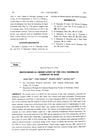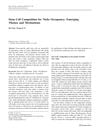 16 citations,
September 2018 in “Scientific reports”
16 citations,
September 2018 in “Scientific reports” Scientists created keratinocyte cell lines from human hair that can differentiate similarly to normal skin cells, offering a new way to study skin biology and diseases.
 15 citations,
May 2021 in “British journal of dermatology/British journal of dermatology, Supplement”
15 citations,
May 2021 in “British journal of dermatology/British journal of dermatology, Supplement” Cell therapy shows promise for treating severe psoriasis but needs more research to confirm safety and effectiveness.
 15 citations,
February 2021 in “Scientific Reports”
15 citations,
February 2021 in “Scientific Reports” RNA aptamers can specifically block FGF5-related cell growth, potentially treating related diseases or hair disorders.
 15 citations,
June 2019 in “eLife”
15 citations,
June 2019 in “eLife” Activin A and follistatin control when hair cells develop in mouse ears.
 15 citations,
May 2010 in “International Journal of Cosmetic Science”
15 citations,
May 2010 in “International Journal of Cosmetic Science” The cell membrane complex in mammalian hair has three distinct types with different structures and chemical properties.
 15 citations,
May 2004 in “Facial Plastic Surgery Clinics of North America”
15 citations,
May 2004 in “Facial Plastic Surgery Clinics of North America” The document concludes that while "hair follicle cloning" shows promise for unlimited donor hair, it faces challenges with consistency and safety in humans.
 15 citations,
January 1992 in “Sen'i Gakkaishi”
15 citations,
January 1992 in “Sen'i Gakkaishi” The Cell Membrane Complex in hair has both water-attracting and water-repelling layers.
14 citations,
February 2022 in “The Journal of clinical investigation/The journal of clinical investigation” Scientists made a mouse model of a serious skin cancer by changing skin cells with a virus and a specific gene, which is similar to the disease in humans.
14 citations,
June 2021 in “Journal of dermatological science” Argan press cake extract might help grow hair and protect hair cells from damage and inflammation.
14 citations,
November 2019 in “Mediators of inflammation” IL-6 from stem cells helps repair skin and grow hair.
14 citations,
May 2017 in “Cell metabolism” Paneth cells and intestinal stem cells work together metabolically for stem cell function and regeneration.
 14 citations,
January 2014 in “Cells Tissues Organs”
14 citations,
January 2014 in “Cells Tissues Organs” Ionizing radiation causes irreversible skin damage, with single doses leading to acute injury and hair graying, and fractional doses causing more severe long-term tissue damage.
 13 citations,
February 2023 in “Aging”
13 citations,
February 2023 in “Aging” A substance from hair follicle stem cells helps heal skin wounds in diabetic mice by promoting cell growth and preventing cell death.
 13 citations,
July 2022 in “Frontiers in cell and developmental biology”
13 citations,
July 2022 in “Frontiers in cell and developmental biology” Tiny natural vesicles from cells might help treat hair loss.
 13 citations,
May 2022 in “Cell discovery”
13 citations,
May 2022 in “Cell discovery” The study found new details about human hair growth and suggests that preventing a specific biological pathway could potentially treat hair graying.
 13 citations,
September 2021 in “Current Issues in Molecular Biology”
13 citations,
September 2021 in “Current Issues in Molecular Biology” Dexpanthenol helps human hair follicle cells grow by preventing aging and death, and by supporting growth signals.
 13 citations,
September 2020 in “International Journal of Molecular Sciences”
13 citations,
September 2020 in “International Journal of Molecular Sciences” PRP therapy and minoxidil combo works best for male hair loss.
 13 citations,
December 2014 in “Stem Cells”
13 citations,
December 2014 in “Stem Cells” Hair and skin can regenerate without bulge stem cells due to other compensating cells.
13 citations,
September 2014 in “Birth defects research” Human epidermal neural crest stem cells could be used for therapies, drug discovery, and disease modeling.
 13 citations,
February 2010 in “Stem Cell Reviews and Reports”
13 citations,
February 2010 in “Stem Cell Reviews and Reports” Stem cells compete for space using cell adhesion, and mutations can affect their competitive success, with implications for tissue health and disease.
 13 citations,
May 2005 in “Seminars in Plastic Surgery”
13 citations,
May 2005 in “Seminars in Plastic Surgery” Follicular Cell Implantation might become a new treatment for hair loss and could lead to advances in organ regeneration.
13 citations,
December 1983 in “Canadian journal of zoology” Heterotypic cell contacts likely help hair matrix cells differentiate during mouse hair follicle development.
 12 citations,
August 2022 in “Biochemical Journal”
12 citations,
August 2022 in “Biochemical Journal” Different types of cell death affect skin health and inflammation, and understanding them could improve treatments for skin diseases.
 12 citations,
May 2019 in “The journal of pharmacology and experimental therapeutics/The Journal of pharmacology and experimental therapeutics”
12 citations,
May 2019 in “The journal of pharmacology and experimental therapeutics/The Journal of pharmacology and experimental therapeutics” Activating TRPV3 channels stops hair growth by killing hair follicle cells.
 12 citations,
April 2014 in “Molecular Medicine Reports”
12 citations,
April 2014 in “Molecular Medicine Reports” Targeting specific miRNAs may help treat hair follicle issues caused by hydrogen peroxide.
 12 citations,
January 2003 in “Dermatology Online Journal”
12 citations,
January 2003 in “Dermatology Online Journal” A new treatment for hair loss was tested and most participants saw their hair loss stop within 2-8 weeks, with up to 50% more hair after 4 months, and no side effects.
 11 citations,
May 2018 in “Philosophical Transactions of the Royal Society B”
11 citations,
May 2018 in “Philosophical Transactions of the Royal Society B” New materials help control stem cell growth and specialization for medical applications.
 10 citations,
November 2022 in “Protein & Cell”
10 citations,
November 2022 in “Protein & Cell” Quercetin significantly helps hair growth by activating hair follicles and improving blood vessel formation around them.
 10 citations,
November 2021 in “Biomedicines”
10 citations,
November 2021 in “Biomedicines” Some therapies using stem cells and platelet-rich plasma may help treat osteoarthritis, but more research is needed to ensure they are safe and effective.
 10 citations,
May 2019 in “BMC Complementary and Alternative Medicine”
10 citations,
May 2019 in “BMC Complementary and Alternative Medicine” The extract from Bacillus/Trapa japonica fruit helps increase hair growth and could be a potential treatment for hair loss.
























